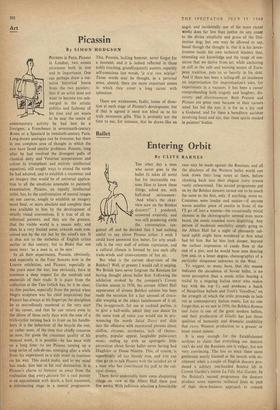Art
Picassin
By SIMON HODGSON POUSSIN in Paris, Picasso in London; two events enormous both in size and in importance. One can perhaps draw a ten- tative historical lesson from the two painters: that if an artist does not want to become too sub- merged in the artistic politics and fashions of his time and yet wants to be near the centre of contemporary activity he, had best be a foreigner, a Frenchman in seventeenth-century Rome or a Spaniard in twentieth-century Paris. Long-drawn analogies can be tiresome, but there is one complete area of thought in which the two have faced similar problems. Poussin, long after he had resolved the divergent pulls of classical unity and Venetian temperament and colour (a triumphant and entirely intellectual equation), still sought ways to extend the mode he had adopted, and to establish a treatment and an imagery that would be of universal applica- tion to all the emotions amenable to painterly examination. Picasso, an equally intellectual artist, has, by the confrontation of mental images on one canvas, sought to establish an imagery more final, or more absolute and complete than was available to him by the development of strictly visual conventions. It is true of all in- tellectual painters, and they are the greatest, that the visible world is a means only, and then in a very limited sense, towards ends con- ceived not by the eye but by the mind's eye. It is thus not to the :esthetics of English critics earlier in this century, but to Blake that one must turn: 'as a man is, so he sees.'
In all their experiments, Poussin, obviously, and especially in the Four Seasons now in the Louvre exhibition, and Picasso, especially in the years since the war, less obviously, have in common a deep respect for the methods and materials of their trade. It is plain from the collection at the Tate (which has, let it be clear, its thin patches, especially from the period when Negro sculpture was his chief inspiration) that Picasso has always at his fingertips the disciplines he so marvellously mastered at the very start of his career, and that he can return even to the idiom of those early days with the ease of a trick-cyclist turning back to front on his handle- bars. It is the behaviour of the bicycle the rest, or rather most, of the time that chiefly concerns us now, for given the consistent quality of his manual work, it is possible—he has been with us a long time--to see Picasso turning up a long series of culs-de-sac, emerging after a while from his experiment in a side street to continue on his way. This could make, and to my mind has made, him late at his real destination. It is Picasso's charm to humour us away from the realisation that every picture for a real painter is an appointment with death, a final, statement, a culminating stage in a mental progression. This, Poussin, lacking humour, never forgot for a moment, and it is indeed reflected in those nobly touching, grandiloquently austere, superbly self-conscious last words, 'je n'ai rien neglige.' Those words may be thought, in a personal sense, absurd; there are more important senses in which they cover a long career with splendour.
There are weaknesses, faults, losses of direc- tion at each stage of Picasso's development, but if that is agreed it must not blind us to his truly enormous gifts. This is probably not the time to say, for instance, that he draws like an angel, and incidentally one of his more recent works does far less than justice on any count to the divine simplicity and grace of the Dal- matian dog; but one may be allowed to say, banal though the thought is, that it is his inven- tiveness inside his own technical mastery that, extending our knowledge and the range of sen- sation that we derive from art, while anchoring us still in the safe and teeming waters of Euro- pean tradition, puts us so heavily in his debt. And if there has been a tailing-off, an insistence on improvisation for improvisation's sake, for experiments in a vacuum, it has been a career comprehending both tragedy and laughter, dis- covery and divertissement. Both Poussin and Picasso are great men because in their careers mind has led the eye; it is for us a joy and a Godsend, and for them a hereditary accident involving hand and eye, that these spirits resided in painters' bodies.






































 Previous page
Previous page